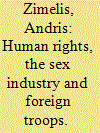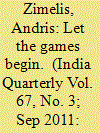| Srl | Item |
| 1 |
ID:
086554


|
|
|
|
|
| Publication |
2009.
|
| Summary/Abstract |
This article explores the relationship between prostitution, nationalism and foreign policies using a feminist analysis framework. Although scholars have dealt with the theoretical role of women in nationalist projects, there is little work factually supporting these theories. There is also a paucity of works demonstrating the role of prostitution in national security policies. This article rectifies these shortcomings and demonstrates that, although prostitution is illegal in Japan, South Korea and the Philippines, these governments have played an active role in supporting and maintaining the prostitution industry geared at servicing US troops. The US troops, in turn, have protected the national security of each of these countries for all of the post-Second World War era. In this context, it seems clear that `national security' does not include the physical, economic, legal and social insecurity of Japanese, Korean and Filipino women despite their contribution to the most quintessential Realist policy - national security.
|
|
|
|
|
|
|
|
|
|
|
|
|
|
|
|
| 2 |
ID:
108587


|
|
|
|
|
| Publication |
2011.
|
| Summary/Abstract |
This article discusses the political role of the Olympic Games and its implications on the hosting country's political and social life by analysing two cases-South Korea (1988) and Mexico (1968). Contrary to the belief that the games were created as an event that transcends politics, this study concludes that Olympic Games have been and are used as a political tool for various purposes and specific political circumstances eventually influenced the selection of Mexico's and South Korea's priorities for national development. Moreover, the findings of this article demonstrate that the Olympic Games served as a catalyst accelerating democratic changes in South Korea, and this finding can be applied to heuristic analysis of the future Olympic Games.
|
|
|
|
|
|
|
|
|
|
|
|
|
|
|
|